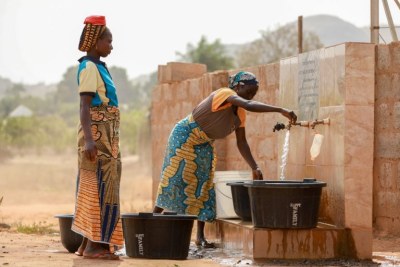-
Nigeria: Out of Sight, Out of Mind - a Community's Struggle to Access Clean Water
Nigeria Health Watch, 24 January 2024
In ensuring access to clean water, sanitation, and hygiene for ALL, we cannot overlook the needs of remote and hard-to-reach communities. Read more »
-
Nigeria: Device That Generate Clean Water From Air Launched
Daily Trust, 24 May 2023
An atmospheric drinking water generating device, which produce clean drinkable water from the air have been launched in Nigeria. Read more »
-
Nigeria: Fadisonka - a Community's Struggle to Access Clean Water
Nigeria Health Watch, 22 May 2023
Fadisonka in Wudil Local Government Area (LGA) in Kano State has as the only source of water for the community, a solar-powered borehole located at the centre of the community. The… Read more »
Remote Nigerian Village Struggles for Clean Water Access
Access to clean water, sanitation, and hygiene is a critical concern in remote communities like Ubo, also known as Simami, in the Rubochi Ward of the Federal Capital Territory in Nigeria, reports Ohanu Dabri Olohije for Nigeria Health Watch. With a population of just over a thousand, primarily comprising Gbagyi and Bassa tribes, the community faces significant challenges in obtaining clean water, relying on dug wells, and, during dry seasons, a stagnant stream for their needs.
The World Bank estimates that 70 million Nigerians lack access to safe drinking water, contributing to child mortality from waterborne diseases. Simami's residents, mainly farmers, endure long journeys and early morning expeditions to secure water, with women and children bearing the brunt of this struggle. Despite government initiatives and a state of emergency declared in the water, sanitation, and hygiene (WASH) sector since 2018, remote communities like Simami feel forgotten, with pleas for boreholes or reliable water sources remaining unaddressed.
The lack of access to clean water not only poses health risks but also exacerbates economic challenges, disproportionately affecting women and girls. Urgent action is needed to bridge the WASH infrastructure gap, considering the impact of climate change on water availability in these communities, especially as the dry season approaches.
InFocus
-
A UNICEF report shows that Nigeria is still one of the top three countries globally in terms of the number of people Read more »

Just like other surrounding villages in Rubochi, access to clean water is a major challenge and the residents rely on dug wells.


